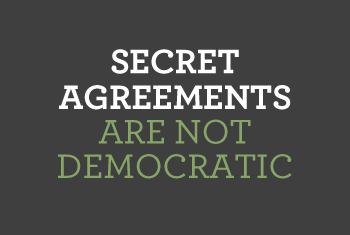Free trade is what the name itself
implies. A trade that is free. A simple explanation for free trade is like a market where traders can
sell whatever they want, regardless of the amount, to whomever they wish to sell
to, without having to bear taxes or be restricted under government policies. By
committing to free trade policies, governments do not
discriminate against imports or interfere with exports by applying tariffs (to
imports) or subsidies (to exports) or quotas.
In theory there should be nothing wrong with free trade. In fact,
through comparative advantage, goods are made cheaper, and there would be a
higher amount of goods produced , with addition of variations in production. What the heck is comparative advantage? Read
that yourself.
People should start reading
before they agree to protest against something.
Associating capitalism with the evil Satan while not knowing what capitalism itself is, for example, is
plain bigotry. Naming liberalism as a heretic West ideology, without even
knowing the basis of liberalism is not
what intellectuals do; it is not what people with brains should ever practice.
Regarding TPPA , just because the media overhyped it as a bad thing, that does
not mean that we should jump into the bandwagon
and protest against it .
To cut it short , TPPA or Trans-Pacific Partnership Agreement is an
agreement of free trade. Countries which signed this agreement are entitled to
deregulate their trade policies when dealing with foreign firms from other
signatory countries. That would reduce import tariffs and loosen environmental
and safety regulations previously
restricted upon imports. This will obviously encourage investment and
increase the volume of both imports and exports in a country. An increase in
foreign investment and demand for exports would bring to an increase in job
opportunities and therefore reduce unemployment. In what way is this TPPA bad?
Please ignore the nuances of reports in the net that employs a rather negative
tone about TPPA without even trying to explain about it.
Sorry for being so boring. I don't know how to
make this fun.
I am an advocate for free
trade. If the Malaysian government actually trusted in free trade, my father
and his neighbours would have bought Mercedes and Bentley instead of those
mysterious local cars-haha- because free trade is the exact opposite of protectionist policies that Mahathir loved so much. Excise duties
would be reduced, quotas would be
removed and imported cars would be so much cheaper. The same goes for all
imported goods which appear expensive , while the actual cost is less than half
the price.
The problem with TPPA is that the
agreement undermines the voice of the people who voted for the government. If
Malaysia joins TPPA, the government would have to conform to deregulation, and
this is made without the people's consent. Environmental laws would be
inapplicable to foreign laws, as they have obtained the 'right for free trade'.
Firms can even demand compensation if domestic environmental policies are
applied to them. Frankly, there is no way those hundreds of thousands of
Malaysians who protested against Lynas , those who stood up against industrial pollution
would ever support this agreement. To add to that , if Malaysia wishes to amend
their policies to make them applicable against those foreign firms, we would
require the agreement of all signatory countries to make it happen. In other
words , should the people demand for better control upon pollution , there is
no way the government could impose such laws upon those invincible firms.
To make it simpler, if a
foreign firm pollutes a river in Malaysia, and our environmental laws demand
them to pay for the damages, the firm can sue our government for compensation,
because they were denied of 'potential future profits' . This is just so wrong
, it doesn't even make sense anymore.
If a foreign firm build
their factories here , domestic laws would again be inapplicable against their
operations. Under TPPA, investors are given rights to procure land, resources,
build factories ,or anything else they invested in. It doesn't matter that they
are given rights to explore our resources, but to give them protection against
safety and environmental laws is not something reasonable.
The lack of regulation would
mean that imported goods would undergo less safety and health checks. Therefore
,even if imported food from signatory
countries contain elements that make people dumb or grow extra limbs, we would just
bring them in , in the name of free trade.
TPPA grants too much freedom for investors and foreign firms. While it's
true that free trade would bring in more job opportunities and economic growth,
there is no reason to give foreign firms the rights to violate our resources
and pollute our lands as they see fit.
Forgive my exaggerations. Correct me if I am wrong.
Peace.




you are a liberalist? Man, I didn't know that. I believe people's economic ideology should be biased towards where they came from. Malaysia's only way to survive is through protectionist policies. Yes, there are downsides due to the long-established regulations, but it's for what's better.
ReplyDeleteInvisible hand does not exist. In any case, TPPA is still bad.
people's economic ideology should not be biased in the first place-it depends upon what they believe.
ReplyDelete